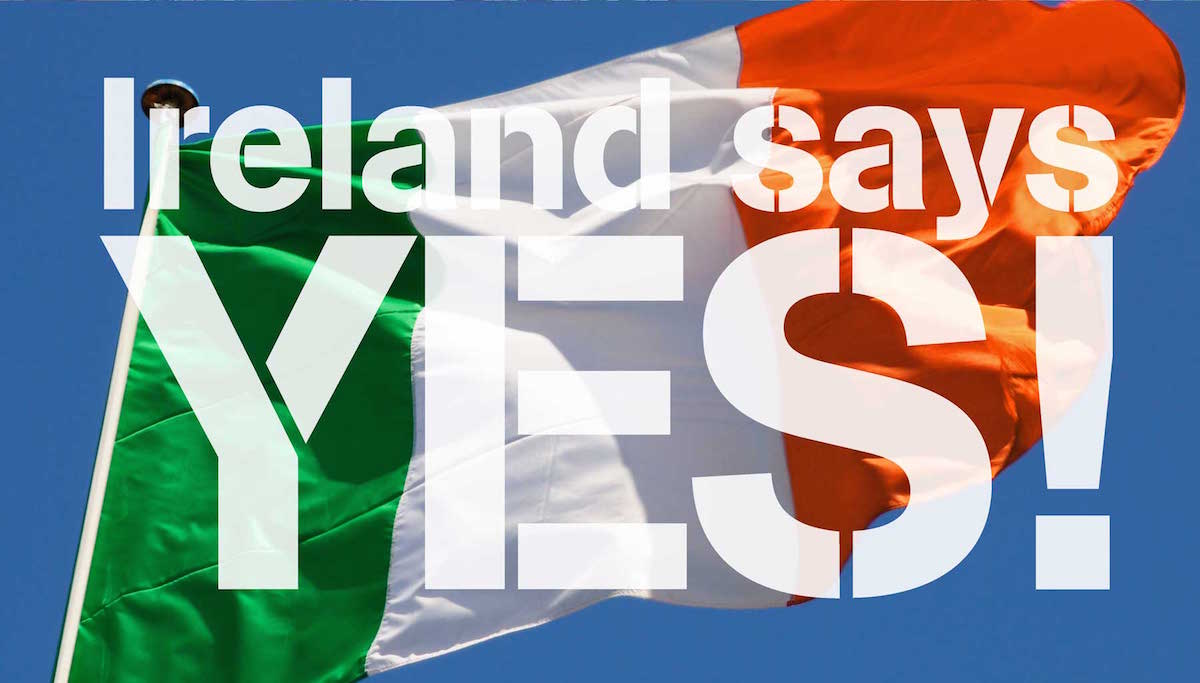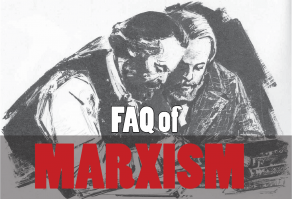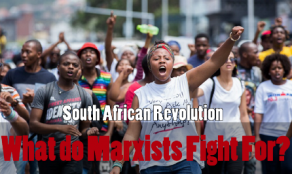Irish voters have decisively voted in favour of marriage equality, making Ireland the first country to do so through the ballot box. This was a victory of the future against the past, of the young against the old, of reason against ignorance, of the forward-looking urban areas against the old backward rural Ireland.
The yes vote exceeded 70% in many parts of Dublin. In some predominantly working class constituencies of the capital the margin was even higher. <>One ballot box from Ballyfermot in West Dublin showed an 85% Yes vote. Only one of the 43 constituencies voted against the proposal – Roscommon-South Leitrim. The total turnout was 60.5%. Same-sex marriage was approved by 1,201,607 votes to 734,300. That means 62.1% yes to 37.9% no.

The Republic of Ireland has a written constitution which can only be changed by referendum. All Irish citizens who are registered were allowed to vote, but there was no postal voting. It is a measure of the passions aroused by the referendum that so many people returned to Ireland from abroad to participate. People came from as far away as the United States, Canada and even Australia to register their vote. Thousands more delayed their working holidays after finishing university exams to register their support for the “Yes” vote.
A social and political revolution
What a change this represents! Let us not forget that this referendum was held only 22 years after homosexual acts were decriminalised in Ireland in 1993. Now marriage between two people of the same sex would have the same status under the Irish constitution as a marriage between a man and a woman. They will be recognised as a family and be entitled to the constitutional protection for families. The result was greeted with an outburst of popular enthusiasm. Thousands of people came onto the streets to celebrate.
The referendum result speaks volumes about the changes that have taken place in the Republic of Ireland. The dead hand of the past, which had lain heavily on Irish society for generations was rudely cast aside. All the live forces of Irish society were mobilised for the “Yes”. All that was dead, stultifying and oppressive was gathered together under the “No” banner, behind which stood the looming presence of the priests, nuns and bishops.
For above all else, this referendum vote was a blow against the age-old dictatorship of the Church. Although it would be premature to conclude that Catholic Ireland is dead and gone, the people of that island woke up this morning to a different country and were breathing a different air, a purer, cleaner air than the suffocating fumes of incense that oppressed the brains of previous generations.
While the major political parties maintained that same-sex marriage is a civil not a religious matter, Catholic bishops argued that it would “encroach on religious beliefs” and have “implications for the welfare of children”. Given the atrocious record of the Catholic Church in the field of children’s welfare, such statements are truly breathtaking in their hypocrisy.
The loudest voice in the No campaign was that of the Iona Institute, a powerful Catholic lobbying group, which is funded by Right-wing American Republicans, who promote "the place of marriage and religion in society". They argue that children should not be raised by gay parents. This conveniently ignores the fact that many children already have gay parents, and the referendum was not actually about gay parenting, or adoption.
The Church’s reactionary role
Over 80 percent of the Irish still identify as Catholics, but in practice this means very little. Ireland used to be the most Catholic country in the world. But that is changing fast. A horrified public was treated to an almost daily flood of stories about child sex abuse involving priests and cover-ups by bishops that shattered the standing of the church hierarchy. In a country that is nominally 85 percent Catholic, empty churches and declining Mass attendance tell a different story. In 1984, nearly 90 percent of Irish Catholics went to Mass every week. But by 2011, only 18 percent did.
From the earliest days of the Republic the Church has played a most reactionary role, and has continued to do so right up to the present day. It stubbornly resisted the right to divorce. The Fifteenth Amendment of the Constitution of Ireland repealed the constitutional prohibition of divorce as late as 1996. And only two years ago, the bishops tried but failed to stop the government and politicians from introducing legislation to allow for abortions in cases where there was a credible suicide threat from a woman if she was forced to continue with her pregnancy. Abortion in Ireland is illegal unless it occurs as the result of a medical intervention performed to save the life of the mother.
From the birth of the Irish Republic, the Church controlled the moral life of the country. It dictated what was right and wrong, who was godly, and who was a sinner. It exercised a dictatorial grip on every aspect of life, morality and politics. The nuns and priests decided what you should think, say and do. They controlled all the most important aspects of a person’s life: birth, death, marriage and childbirth. They condemned “communist beliefs” and atheism, for which you would suffer the torments of eternal hellfire.
This Holy dictatorship existed not just at Mass on Sundays, but in schools, boarding houses, hospitals, asylums – even the local dances. And though it preached the love of God, it was the fear of God that it used to terrorise people and make them submit to its will. The priests and nuns controlled education and shaped the minds of little children according to their own convenience. In the villages the priest would go from house to house every year to enquire why there were no babies this year. Perhaps men and women were using contraceptives?
They reserved the right to lift the sheets on the beds of married couples to see what was going on in the most intimate places of one’s life. If some poor girl, lacking either the knowledge of contraceptives or access to them, happened to fall pregnant outside marriage, God help her! The poor creature was placed at the tender mercy of the “sisters” who would castigate and humiliate her, and then compel her to hand over her child to the care of the Church. This was the gateway to Hell for countless thousands of Irish children who suffered unspeakable tortures at the hands of those who were supposed to care for them. This was one of the blackest pages of Irish history, the whole horror of which has yet to be fully exposed. The Vatican has routinely protected individual priests who were raping boys and, to a lesser extent, girls, responding to complaints of abuse by transferring offenders to other parishes.
The scale of the abuse was greater in Ireland than in any other country. Ireland had hundreds of such cases, but because of the enormous power of the Irish Church, it was not just a matter of individual priests but large institutions. Until the 1990s, the church ran orphanages and industrial schools where 30,000 children deemed to be delinquents were incarcerated for petty offenses like pickpocketing, as well as those with unmarried parents or simply the children of the poor.
The 2009 Ryan Report found that thousands of children were savagely raped or sexually abused in these homes, while thousands more were beaten, starved and forced to work. Boys described nights of terror, lying in bed waiting for priests to come and sodomise them. "In some schools a high level of ritualized beating was routine," the report stated. The nightmarish reality of these torture centres for defenceless children was exposed with the recent discovery of the bodies of up to 4,000 infants and children, many malnourished and badly treated, in unmarked graves at homes for unwed mothers run by Catholic nuns.
If Irish people needed any other reason to shake off such an oppressive force, they found it in the shocking revelations of the widespread and deep rooted abuse of the most vulnerable people in society that the Church both carried out and covered up for many decades. "They made this island into a concentration camp where they could control everything — and the control was really all about sex," says Father Mark Patrick Hederman, abbot of Glenstal Abbey. "Generations of people were crucified with guilt complexes. Now the game is up."
The priests were supposed to be the guardians of sexual purity. But many of these “guardians” of morality have been exposed as sexual predators who satisfied their bestial appetites and sadistic tendencies on defenceless little children with absolute impunity. The faith of Irish people in the priesthood has been shattered. The Church itself is in crisis and enrolment in seminaries has plummeted to the point that the church will have to start importing priests from other countries.
By inflicting such a defeat on the Church, the Irish people have struck a blow for freedom, equality and democracy.
This vote represents nothing more or less than a social and political revolution. It represents a giant step from a reactionary theocratic Church-dominated state towards a democratic, secular Republic. It will be welcomed with enthusiasm by all those who love freedom and hate oppression, obscurantism and discrimination against minorities. Today the people of Ireland can stand proud. They have won the respect and admiration of progressive forces all over the world.
The molecular process of socialist revolution
However, the Irish referendum has a far deeper significance than the immediate issues at stake. It is a manifestation of what Trotsky called “the molecular process of socialist revolution.” Everywhere we look we can see the same process unfolding. There is a deep malaise in society. Beneath the apparent calm, in the subterranean depths of society there is a ferment of discontent, of anger, of rage, and above all of frustration. People feel that their voice is not being heard, that the politicians do not represent them. There is a growing anger against all the existing institutions: the bankers, the media, the judiciary, the police, the Church. All are seen as part of a system that is broken beyond repair and a morality that is rotten to the core.
Ireland is passing through the same deep crisis as the rest of Europe. Nobody talks any more of the “Irish tiger”. The government of Fine Gael and the Labour Party has carried out a policy of cuts and austerity. As a result the Irish people have suffered seven years of austerity and falling living standards. The government faces elections in early 2016, and there are clear signs that people are no longer prepared to put up with more spending cuts and tax increases.
The IMF holds up Ireland as a glowing example to follow. But the real situation of the people is shown by the following extract published in <emColliers:
“My wife is a public servant who on the face of it has an above average salary. But in recent years she has endured close to a 20 percent net pay reduction. On top of this, we have, like others, had to absorb increasing food and fuel prices and a whole range of new taxes and local government charges that have been introduced in recent years.
“As a family, our weekly household budget is becoming severely constrained. What little savings we had have long since disappeared. Increasing taxation and other charges, coupled with a reduced household income, mean that we often have little or no cash to spare at the end of any given month. Tellingly, a recent survey conducted by the Irish League of Credit Unions found that a quarter of the population (1.1 million people) have less than 50 euro ($68) a month of disposable income left after paying essential bills.
“We buy little or no luxuries for ourselves. We seldom purchase clothes either – the children get first priority when it comes to clothing and footwear, and only then when a purchase is absolutely necessary. We don’t dine out, and only see our friends mainly at occasional social gatherings such as weddings or christenings which thankfully, because of the costs of such events, are becoming less frequent.
“In fact, all occasions have been greatly reduced. We scrimp for months to ensure we can afford presents for our children at Christmas. And birthday parties have likewise been greatly scaled back. We have noticed over recent years that the presents received by our children from their friends on these occasions have got increasingly smaller while some kids, undoubtedly from households under even more pressure than ours, don’t bring presents at all.
“Overall the cumulative effect of seven years of fiscal austerity, with the promise of more to come, has severely depressed demand among Irish consumers. Those who are fortunate enough to have money more often than not hold onto it with dear life due to fears for job security or as a hedge against future taxation. As a result, shop and pub closures are a regular occurrence.
“And we are not alone. For thousands of others the situation is far, far worse. Behind many closed doors in Ireland, families are silently suffering tremendous despair brought about by financial stress. An acquaintance of mine told me that her husband, a mortgage arrears collection agent working for a bank, witnessed deeply harrowing scenes of families with young children surviving on breakfast cereals and huddling in cold candle lit rooms because their electricity supply had been disconnected.”
The average Irish household is hugely indebted to the banks. When this personal debt is added to the overall government debt, Ireland is the most indebted nation on earth. 18.4% of all mortgages are in arrears or have had to be restructured: well above the average for Germany, France, Britain or the US. Many struggling families live in fear that they will ultimately have their homes taken from them.
Many doctors report a sharp increase in the numbers of people suffering from severe anxiety, depression, and insomnia directly attributable to their financial circumstances and pressure from lending institutions. A woman with a young family speaking on national radio said that Saturdays and Sundays were the only two days of the week when she wasn’t overwhelmed with stress. The weekend was the only time when there were no upsetting phone calls from the banks or disconnection notifications from utility providers arriving in the mail.
There has been a big increase in the number of suicides related to the economic downturn and the sense of despair brought on by joblessness. Recently, the Wexford County coroner commented that the suicide rate in his region among young people had become a “major epidemic.” People no longer believe what the newspapers say. A protester in a recent demonstration against media bias in Ireland said: <em“Suicide is in overdrive yet the media don’t mention why this is happening, our hospitals are lacking beds, people have been stripped of their medication and the government message is: you look after yourself,” he said. <em“I don’t see recovery, no one I know is experiencing recovery. The media will tell you we are in a recovery. It’s not true,” he added.
As in Britain also, help from charities has become an essential lifeline for many poor people. Soup kitchens have opened up in large population centres such as Dublin, Athlone, and Cork to offer food aid to sizable numbers of cash strapped families and individuals struggling to buy even the basics. Teachers are reporting that many children attend school hungry because there is no food at home. The unrelenting stress brought about by brutal austerity and debt is putting unbearable strain on personal relationships and family life. Marriage breakups and incidences of domestic violence have increased.
The Irish government insists on pressing ahead with its aim of paying “our debts”, by which they mean the tens of billions which were originally the banks’ debts. Meanwhile those in charge of banks bailed-out by state handouts walk away with lavish pay-outs. While the bankers and bankrupt property developers have had their colossal debts taken off them by the Irish state and are living in their palatial homes, dining in the finest restaurants and relaxing on the best golf courses, life for the majority of people is a struggle.
All these contradictions are piling up and this is producing sharp changes in consciousness. The referendum result was only one manifestation of this. There is a general sense of unfairness, that something is wrong in society. There is growing outrage at the inequality, the corruption, the gross unfairness of a system where the rich grow ever richer and the poor ever poorer.
The crisis of capitalism falls especially heavily on the shoulders of young people. Over thirty percent of those between the ages of 15 and 24 are out of work. Many graduates and school leavers are forced to choose between years on welfare or emigrating to find work. It was no accident that the "Yes" vote was strongest among younger voters. The new generation of Irish youth, like their brothers and sisters in other countries, are reacting against the so-called values of the existing society, its values, morality and its beliefs.
Young people everywhere are looking for alternatives and are wide open to the ideas of revolutionary Marxism. The youth of Ireland is awakening. They are shaking off the dead weight of the past. In the course of struggle they will rediscover the wonderful revolutionary traditions of Ireland and Irish Labour. Under the red flag of socialist revolution – the flag of Marx and Lenin, of Trotsky and Rosa Luxemburg, of Larkin and James Connolly – they will triumph in the end.
London, 24 May 2015.


